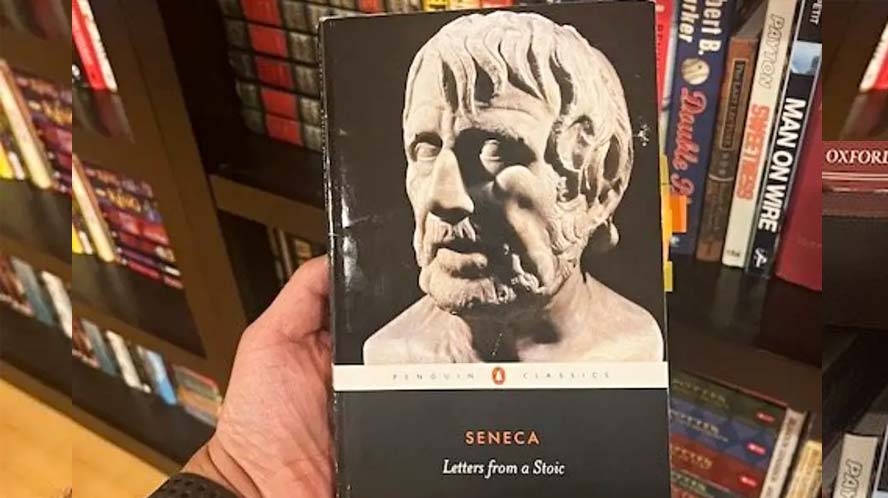
Title: Letters From a Stoic (also known as Epistulae Morales ad Lucilium)
Author: Seneca
Year: c. 65 AD
Publisher: First printed at Naples in 1475
“We suffer more in imagination than in reality.” –Seneca.
“Letters From a Stoic” is a compilation of writings by Seneca (letters to his friend Lucilius), in which he talks about morals, virtues, good, evil, and nature; basically, a debate about how a man should act and be. For this book, first, we need to know who Seneca was then, I will share six of his letters which, in my opinion, are the best ones, and some general takeaways to reflect on and to start thinking like a true Stoic.
Who was Seneca?
Lucius Annaeus Seneca the Younger was a Stoic philosopher of Ancient Rome, born in Cordoba in Hispania and raised in Rome.
He had a quiet a life – he was exiled to Corsica, but then was able to come back to become Nero’s tutor, an influence which declined during the years till the point where he was forced to commit suicide. His Stoic and calm suicide was a reflection of his high values and was the inspiration for several paintings.
In short, Seneca had everything, then nothing, but his grateful and courageous attitude was always the same. That is why these letters are so important and valuable because they teach us how to live a life of high values while being at peace with ourselves. Let’s explore some of his letters.
Letter II
Learn to be in your own company, read good books, and instead of reading 20 books at once, read one, reflect and then get a new one. And if you want some “fresh air” reread one of your books and learn to digest the information more fully.
Learn to know yourself. Going hither and yon does not work, you might have lots of properties and know lots of people but you still might not have a real home or real friends. Beware of wealth; do not be a slave of money, poverty is when you do not know when to say “enough.”
Letter V
Do not seek attention, seek self-improvement. Take care of yourself, live a simple and understandable life, and do not let desire nor the worries of the past or future bother you; leave desire (and therefore hope) and be present, now, today.
Letter VII
Fear crowds, once you are there you lose your virtue:
“Kill him.”
-Why?
“He is a murderer.”
-No, why are you watching?
Do not surround yourself with that kind of people, nor be their enemy – look for people from whom you can learn and teach. Do not seek the crowd’s validation or acknowledgement; your trophies should be praised inside, not outside. “Your merits should not be outward facing.”
Letter IX
“A content man” the letter talks about this idea of being “content“; with others and material things; it also shows a difference between them and the cynics (another school).
In short it says:
- Be happy with what you have.
- To be alone is fine, to be with friends is fine.
- The basis of friendship should be to be in the disposition for the other and not the other way around.
- Learn to be simple; reflect on your values and what you need.
Letter XV
Train the body, but do not fill it with just muscles, give some space for your spirit. Give your body and mind time to rest; to be refreshed. Read, walk, write, listen, and talk; and let the last one exercise you. Put some limits and be grateful, always be grateful; do not be like the clown, a life full of anxiety.
Letter LXXVIII
There are times when even to live is an act of bravery.
Not to give in to adversity.
Never trust property.
Take full note of fortune’s habit of behaving just as she pleases.
This letter talks about illness and the desire to end suffering. Be brave, accept; embrace your burden with dignity; your body might be affected but you still have your mind. Do not worry about people’s pity; sometimes that is what makes us sick; go back to your natural state (a sick stomach only eats what it needs).
Surround yourself with good people, and accept philosophy – she will cure you.
General Takeaways
- Reflect on yourself daily.
- Be in sync with nature.
- Learn to be with yourself.
- Do not be a slave of the material world.
- Read good books, and have good mentors.
- Embrace philosophy.
- Take one step at a time; do not rush, good things take time.
- Be grateful for what you have.
- To learn repetition is key.
- Be aware of your words (and people’s words), they will shape your actions.
- Take care of your soul and character.
And remember: “No man’s good by accident.” – letter CXXIII.
Favourite Quotes
- “You can only acquire it successfully if you cease to feel any sense of shame.”
- ”Every journey has an end.”
- “How can a thing possibly govern others when it cannot be governed itself?”
- “You want to live-but do you know how to live? You are scared of dying-and, tell me, is the kind of life you lead really any different from being dead?”
- “If you really want to escape the things that harass you, what you’re needing is not to be in a different place but to be a different person.”
I hope you found this review article thought-provoking and I encourage you to learn and read more, not just from Seneca, but from Stoics such as Marcus Aurelius, and their high-value lessons.









